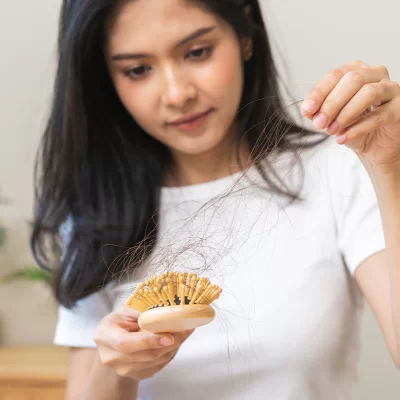Postpartum hair loss
- Why do hair fall out after pregnancy?
- How long does hair loss last after pregnancy and when does it start?
- What supplements to use for hair loss?
- How to take care of hair and scalp during the postpartum period?
- Does breastfeeding worsen hair loss?
- When is hair loss after pregnancy a cause for concern?
- What professional treatments help to prevent hair loss?
Why do hair fall out after pregnancy?
Hair loss after pregnancy is a natural phenomenon, often referred to as telogen effluvium. Its main cause is rapid hormonal changes. During pregnancy, high levels of estrogen and progesterone significantly prolong the hair growth phase, making the hair thicker and stronger. However, after childbirth, the levels of these hormones drop drastically, resulting in many hairs transitioning to a resting phase, followed by increased shedding.
The condition of the hair is also negatively affected by other factors:
-
stress,
-
chronic fatigue,
-
nutrient deficiencies,
-
irregular sleep,
-
postpartum depression,
-
increased prolactin levels associated with breastfeeding.
All of these factors are part of the natural regulation of the hair cycle after such an intense period.
Hair loss after pregnancy is a completely natural phenomenon. The main cause of it is hormonal changes, although other factors may also be significant. Usually, this problem occurs between the 1st and 3rd month after childbirth, with the most intense shedding observed in the 2nd and 3rd month.
Fortunately, this is a temporary process, typically lasting from 6 to 24 weeks. Full hormonal stabilization usually occurs within 6-12 months. It is rare for hormonal imbalances to persist longer, up to a maximum of 15 months.
After this period, hair begins to regrow, and the appearance of so-called baby hair is a clear sign of their regeneration. Although they may be temporarily thin, their condition gradually improves, which is only a matter of time.
To have strong hair that stops falling out, you should ensure a balanced diet rich in essential nutrients. Include vegetables, fruits, whole grains, and fish (e.g. salmon) that provide omega-3 fatty acids in your meals.
For proper hair growth, specific nutrients are required. Key vitamins include:
- B group - especially biotin (B7), folic acid, pantothenic acid (B5), B6, B12,
- D3,
- A,
- C,
- E.
Hair condition is supported by minerals:
- iron,
- zinc,
- selenium,
- copper,
- silicon,
- magnesium,
- iodine,
- sulfur.
Also, remember about sulfur amino acids (L-cysteine, L-methionine) that build keratin. In case of hair problems, consult a doctor regarding supplementation (e.g. collagen, MSM, horsetail extracts). It is also important to drink water regularly - proper hydration is the basis for healthy hair.
Postpartum Hair Care Hair after childbirth often becomes weakened, so its care requires special attention. Opt for gentle shampoos and conditioners - dermocosmetics or natural products that will not irritate the sensitive scalp are ideal. Look for products rich in biotin and keratin, which will effectively strengthen the strands. Additionally, to stimulate microcirculation and improve blood flow to the scalp, use:
- scalp treatments,
- ampoules,
- scalp care routines,
- regular scalp massages,
- exfoliants.
Don't forget about natural methods to strengthen hair, such as oiling with argan, coconut, or castor oil. Herbal rinses, e.g., nettle, birch extract, or chamomile flower, will complement your hair care. Also, remember to avoid tight hairstyles and refrain from aggressive styling treatments that further burden the hair.
Hair loss after pregnancy is a common condition, and its main cause is not breastfeeding itself, but the sharp drop in estrogen levels after childbirth. Although lactation and the continued high level of prolactin can potentially prolong the period of increased hair loss, they are not the main reason for weakening hair follicles. It is important to remember that feeding a baby significantly increases the body's demand for nutrients. If the diet is not properly balanced, emerging deficiencies can exacerbate the problem of hair loss. Therefore, it is extremely important during this period to take care of proper nutrition.
It is natural for hair to fall out more intensively after childbirth, and this condition usually resolves on its own. However, there are certain signs of more serious issues that should not be ignored, as a visit to a specialist is necessary if they occur.
When dealing with excessive hair loss, it is advisable to seek help from a dermatologist, trichologist, or even a gynecologist. It is important to react when hair loss is particularly severe or lasts longer than 12-15 months.
Moreover, increased hair loss can be a symptom of other health problems that may exacerbate it. These include:
-
iron-deficiency anemia, often indicated by low ferritin levels;
-
thyroid disorders, such as thyroiditis - in such cases, it is worth checking the TSH level;
-
scalp conditions, such as seborrheic dermatitis.
To make a diagnosis, it is recommended to perform blood tests and trichoscopy. Both a dermatologist and a trichologist are able to determine the cause of the problem and develop a personalized treatment plan.
When home remedies and supplements do not bring results in the fight against excessive hair loss, it is worth considering specialized treatments.
One of them is needle mesotherapy, which involves injecting vitamin cocktails or platelet-rich plasma (PRP) into the scalp. They stimulate hair follicles and improve circulation.
Another popular method of combating excessive hair loss is carboxytherapy, using carbon dioxide. Administered subcutaneously, it stimulates microcirculation and oxygenates hair follicles, strengthening them.
It is also worth considering oxygen infusion, during which active nutrients are introduced deep into the scalp under pressure of compressed oxygen.
These treatments offer numerous benefits:
-
significantly slow down hair loss,
-
accelerate hair growth,
-
visibly improve the overall condition of the hair,
-
make the hair stronger and healthier.
